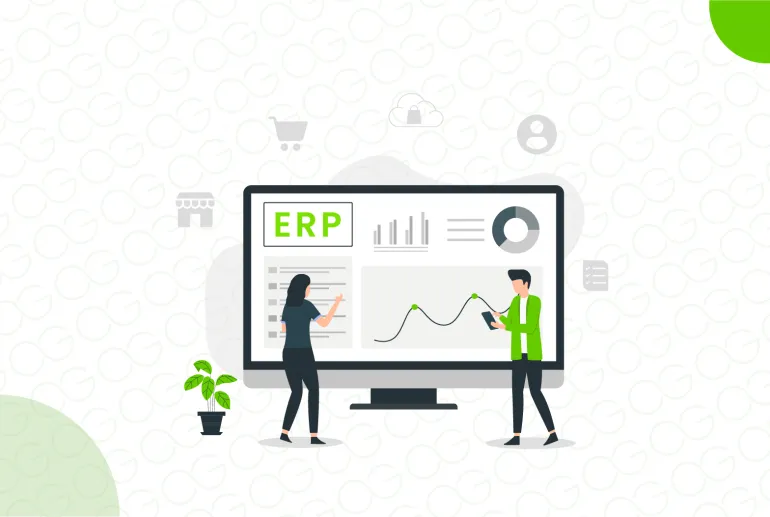Importance of e-commerce integration with an ERP system
In today’s digital age, e-commerce has revolutionised the way companies sell their products and services. With 24/7 accessibility, it offers customers the opportunity to shop anytime and anywhere, while businesses benefit from reduced overhead costs, broader market reach, and greater scalability. However, running an e-commerce storefront alone is not enough to ensure success. A crucial element that often gets overlooked is integrating this storefront with an efficient backend ERP (Enterprise Resource Planning) system.
While many business owners might manage non-integrated e-commerce platforms and ERP systems separately, this can create inefficiencies, lead to data silos, and increase the chance for costly errors. The lack of integration can result in an enormous amount of redundant work, delayed processes, and missed opportunities. By integrating e-commerce with an ERP system, businesses can gain a significant competitive edge by streamlining operations, improving data accuracy, and enhancing the overall customer experience.
In this article, we will explore the importance of integrating an e-commerce platform with an ERP system, the various benefits it brings, and why this integration is critical to modern business success.

Scale your e-commerce business effortlessly with seamless ERP integration.
1. Why E-commerce Integration with ERP Matters
At the core of any successful business is the seamless flow of data between its various departments—sales, accounting, inventory, customer service, and supply chain management. For businesses operating in the e-commerce space, ensuring that all these elements work in sync is essential for efficiency and profitability. Integration between an e-commerce platform and an ERP system allows businesses to manage everything from orders and inventory to customer data and financial reporting in real-time. Without this integration, many companies struggle with inefficiencies, delayed order processing, and a disconnect between their online and offline operations.
Here’s why e-commerce integration with an ERP system matters:
- Improved Operational Efficiency: By connecting your e-commerce platform with your ERP, you can automate various tasks such as order fulfilment, inventory updates, and financial reporting. This reduces manual work and helps operations run more smoothly.
- Real-Time Information: Integrated systems ensure that data—whether related to inventory, sales, or customer information—is updated in real-time across all departments, providing clear visibility.
- Enhanced Customer Experience: When orders are processed quickly, inventory levels are accurate, and customers receive timely updates, it leads to improved customer satisfaction and retention.
2. Key Benefits of an Integrated E-commerce and ERP System
a) Reduction in Labour Costs
An integrated system can streamline multiple business processes, reducing the need for manual intervention. When orders placed on the e-commerce platform are automatically synced with the ERP, businesses can eliminate manual data entry, reducing human error and freeing up employees to focus on more strategic tasks.
Key Points:
- Orders are processed automatically, reducing the need for manual order entry.
- Streamlined operations lead to a reduction in operational costs.
- Employees can focus on high-priority tasks rather than repetitive data management.
b) Optimization of Inventory Management
One of the biggest challenges for any e-commerce business is managing inventory effectively. Without proper integration, businesses may face overstocking or stockout issues, leading to lost sales opportunities and dissatisfied customers. When e-commerce is integrated with ERP, real-time inventory data is shared between the online store and backend systems. As a result, the moment a customer places an order, the stock level is updated automatically, and the inventory is decremented across all sales channels.
Key Points:
- Real-time inventory updates help avoid overstocking or understocking issues.
- Accurate data allows businesses to better plan their procurement strategies.
- A transparent inventory system helps optimise cash flow and reduce holding costs.
c) Reduction of Data Discrepancies and Errors
Manual data entry between different systems often leads to discrepancies, inconsistencies, and errors. An integrated system prevents these issues by ensuring that product, inventory, and sales data are consistently updated across platforms. As online orders flow seamlessly into the ERP system, businesses can reduce redundant manual entries and avoid costly errors related to shipping, billing, or customer information.
Key Points:
- Automation minimises human error and redundant data entry.
- Consistency in data between e-commerce and ERP systems ensures accurate order fulfilment.
- Reduced discrepancies lead to faster problem resolution and fewer delays in order processing.
d) Improved Financial and Accounting Accuracy
Financial management is one of the most critical aspects of any business, and the integration of e-commerce with ERP helps streamline the financial aspects of order processing, billing, and invoicing. When sales data is automatically transferred to the ERP, businesses can gain complete visibility over their finances, improving accuracy and eliminating the need for manual reconciliation between multiple systems.
Key Points:
- Financial data, including sales, expenses, and revenue, is automatically synced between platforms.
- This improves cash flow management, tax reporting, and overall financial transparency.
- Real-time financial updates offer insights that enable better decision-making.
e) Enhanced Customer Experience
A seamless customer experience is critical in today’s competitive market, and an integrated e-commerce and ERP system helps businesses deliver just that. With the integration, customers can enjoy a more streamlined shopping experience, from order placement to delivery. Real-time order tracking, automated shipping notifications, and accurate inventory availability all contribute to customer satisfaction and loyalty.
Key Points:
- Customers receive faster, more accurate order updates.
- Real-time stock availability minimises the risk of order cancellations due to stockouts.
- Enhanced transparency improves customer trust and encourages repeat business.

Streamline your order processing and inventory management with Ginesys ERP.
3. Why Non-Integrated Systems Fall Short
Many businesses, especially those in their growth phase, tend to rely on non-integrated systems, often using separate platforms for e-commerce and ERP. While this may work in the short term, non-integrated systems can lead to a host of problems as the business scales, including inefficiencies, data silos, and delayed reporting. As the number of orders grows, managing both systems independently can become cumbersome, leading to bottlenecks and errors in order fulfilment, inventory management, and customer service.
4. Critical Features of an Integrated E-commerce ERP System
To fully harness the power of an integrated e-commerce and ERP system, businesses should ensure that their solution offers the following features:
a) Real-Time Data Synchronisation
An integrated system should offer real-time data synchronisation, ensuring that information such as sales orders, inventory levels, and customer details are updated instantly across all platforms. This prevents issues like overselling, stockouts, and outdated customer information.
b) Multi-Channel Support
Many businesses operate across multiple sales channels, such as online marketplaces, social media platforms, and physical retail stores. An integrated system should support multi-channel operations, providing a unified platform to manage orders, inventory, and customer data across all channels.
c) Scalability
As businesses grow, so do their operational needs. An integrated e-commerce and ERP system should be scalable, allowing businesses to add new products, locations, or sales channels without experiencing system slowdowns or data integration issues.
d) Comprehensive Reporting and Analytics
A key benefit of integration is the ability to generate comprehensive reports that combine data from both e-commerce and ERP platforms. These reports should provide insights into sales performance, inventory levels, customer behaviour, and financial data, helping businesses make informed decisions.

5. Challenges of E-commerce and ERP Integration
While integration offers numerous benefits, it’s not without its challenges. Businesses may face obstacles such as high initial costs, disruption to existing processes, and the complexity of integrating legacy systems with modern e-commerce platforms.
Key challenges include:
- Cost: Implementing an integrated system may require a significant upfront investment in software, infrastructure, and employee training.
- Business Disruption: Transitioning from non-integrated systems to an integrated one may cause temporary disruptions in operations, affecting order processing and customer service.
- Complexity: Integration may be more challenging for businesses with older or custom-built ERP systems, requiring additional resources to ensure a smooth transition.
6. How Ginesys ERP Facilitates E-commerce Integration
Ginesys ERP is a powerful tool designed to streamline e-commerce operations by integrating online sales platforms with backend systems. With its robust features, Ginesys ERP helps businesses synchronise data in real-time, manage inventory across multiple channels, and reduce manual errors, all while providing comprehensive reporting capabilities.
Key Features of Ginesys ERP:
- Real-Time Order Management: Ginesys enables businesses to automatically sync online orders with their ERP, ensuring accurate order processing and faster fulfilment.
- Multi-Channel Integration: Ginesys supports integration with various sales channels, allowing businesses to manage inventory and orders across all platforms.
- Customizable Reporting: Businesses can generate customised reports to gain insights into sales, inventory, and financial performance.

Ready to integrate your e-commerce and ERP systems?
Future of Retail is Powered by Integration
In the ever-evolving retail landscape, businesses must be equipped with the right tools to stay competitive. Integrating e-commerce platforms with ERP systems is no longer a luxury—it’s a necessity. The benefits of integration extend beyond operational efficiency to include better customer experiences, reduced labour and inventory costs, and improved financial accuracy. By adopting an integrated system, businesses can streamline their processes, reduce errors, and position themselves for growth in a competitive market.
For businesses looking to scale and succeed in the modern digital economy, investing in e-commerce and ERP integration is a strategic move that will deliver long-term value. Systems like Ginesys ERP make it easier to manage both online and offline sales channels, optimise inventory, and offer superior customer service, all of which are key to thriving in today’s retail world. Get in touch with Ginesys today!

